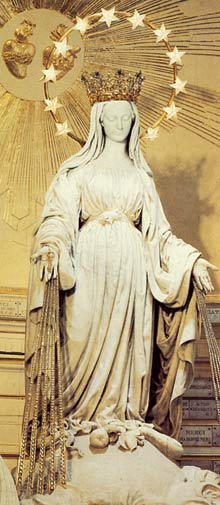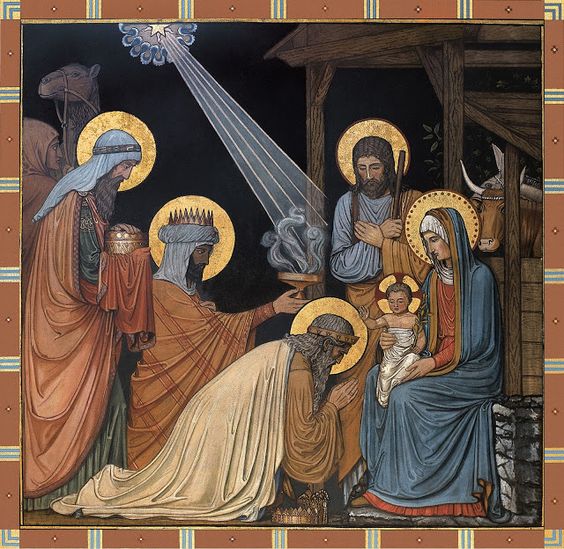Verba vitae aeternae habes

Third Saturday of Paschaltide
Acts 9:31-42
John 6:60-69
Paschaltide With Mary
There is a particular grace attached to the celebration of these Saturdays of the Blessed Virgin Mary in Paschaltide. Nobody experienced the joy of the Resurrection as did the Mother of Jesus, just as nobody experienced His bitter Passion as she did. This is why the surest way to enter deeply into the Paschal Mystery is in the company of Mary or, if you will, through her Immaculate Heart.
Hearts Made for Each Other
The Immaculate Conception has a unique and unequaled sensitivity to the joys of the God-Man, her Son, just as she has a unique and unequaled sensitivity to the sorrows of His Sacred Heart. The most pure Heart of Mary is perfectly attuned to the Heart of Jesus. Nothing of what belongs to His experience is foreign to her. And nothing of what belongs to her experience is foreign to Him. Her Heart was made for His, and His Heart was formed for hers by the Holy Spirit in her womb.
Receiving From Her Hands
As Mediatrix of All Graces, Mary dispenses the gift of a share in her compassion to those of her children who are open to receiving it. Similarly, she dispenses the gift of a share in her joy at the Resurrection of her Son to those who are open to receiving it. Our Lady stands above us with open hands, just as she is depicted at the rue du Bac. Streams of grace flow from her hands. Some of these are bright; they signify the graces that souls welcome and receive with desire and gratitude. Others are dark; they signify the graces that she is ready to give, but that no one welcomes. One of the lessons that emerges from the apparitions to Saint Catherine Labouré at the rue du Bac is that a soul does well to say to the Blessed Virgin, “Give me, beloved Mother, the graces that no one else wants; the gifts that no one else claims; the blessings to which no heart is open.”
An Abyss of Light
We have been listening over the past week to Our Lord’s discourse on the Bread of Life in the sixth chapter of Saint John’s Gospel. Today we come to the end of this chapter, only to affirm, once again, that it is inexhaustible; that it is, like the Prologue and like the seventeenth chapter of Saint John’s Gospel, an abyss of light.
Arrogant Spirits
Are there, perhaps, graces attached to the hearing of the sixth chapter of Saint John that go unwanted, that remain unclaimed? Are there obstacles to receiving these graces? Look closely at what happens in today’s Gospel. There are, among Our Lord’s disciples, those who say, “This is strange talk, who can be expected to listen to it?” (Jn 6:61). Those who call Our Lord’s discourse strange set themselves above it. They are infected with an arrogance of the spirit. Intellectual arrogance is a manifestation of the capital sin of pride. Saint John tells us that Jesus was inwardly aware that they were complaining over his teaching. Complaining is the same thing as murmuring or grumbling. It too is one of the bitter manifestations of the capital sin of pride.
Humble Hearts
The gift of faith is given most abundantly to the humble, to the little, and to the poor. That is why Our Lord says, “I told you that nobody can come to me unless he has received the gift from my Father” (Jn 6:66). True devotion to the Blessed Virgin Mary –not to be confused with the merely routine practice of external acts of piety — reaches deep into the soul to pull out the roots of pride and of the other capital sins. The love of the Blessed Virgin renders the soul capable of receiving that gift of the Father by which one goes to the Son, not slowly, not sluggishly, but with winged feet!
The Blessed Virgin and the Eucharist
Those who “go away” from the Mother will, sooner or later, “go away” also from the Son, especially from the Son in the adorable Sacrament and Sacrifice of His Body and Blood. One has only to look at the various Protestant denominations marked by indifference or hostility to the Mother of Jesus, denominations where there is no real Marian piety. In every case you will find, concomitantly, a rejection of Our Lord’s clear teaching in the sixth chapter of Saint John: a refusal to accept the ineffable gift of the Real Presence, of the Mass as a true sacrifice, and of the priesthood. Those who separate themselves from the Mother will, sooner or later, separate themselves also from the Sacrament of the Eucharist, and from the Catholic Church that the Eucharist assembles and constitutes.
Destroyer of Heresies
In a Tract of the Mass of the Blessed Virgin Mary, the Church sings, “Virgin Mary, rejoice, for you alone have destroyed all heresies.” Where Mary is kept at a distance the faithful are no longer immunized against false teachings. And so what happens? Saint Paul tells us that, “The time will surely come, when men will grow tired of sound doctrine, always itching to hear something fresh; and so they will provide themselves with a succession of new teachers, as the whim takes them, turning a deaf ear to the truth” (2 Tim 4:3).
To Jesus, Through Mary, With Peter
If you would go to Jesus, saying, “Thy words are the words of eternal life; we have learned to believe and are assured that thou art the Christ, the Son of God,” then know, beyond any doubt, that the shortest and safest way to Jesus is, through Mary, with Peter. To Jesus, through Mary, with Peter. This is the Catholic way. Take it, and you will live.

